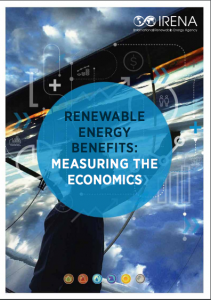According to a new report, achieving a 36 percent global share of renewable energy by 2030 would increase global domestic product (GDP) by up to 1.1 percent or nearly U.S. $1.3 trillion. “Renewable Energy Benefits: Measuring the Economics,” conducted by the International Renewable Energy Agency (IRENA), provides a global estimate of the macroeconomic impacts of renewable energy deployment. Specifically, it outlines the benefits that would be achieved under the scenario of doubling the global share of renewable energy by 2030 from 2010 levels.
“The recent Paris Agreement sent a strong signal for countries to move from negotiation to action and rapidly decarbonise the energy sector,” explained Adnan Z. Amin, IRENA  Director-General. “This analysis provides compelling evidence that achieving the needed energy transition would not only mitigate climate change, but also stimulate the economy, improve human welfare and boost employment worldwide.”
Director-General. “This analysis provides compelling evidence that achieving the needed energy transition would not only mitigate climate change, but also stimulate the economy, improve human welfare and boost employment worldwide.”
The report also looks at country-specific impacts. Japan would see the largest positive GDP impact (2.3 percent) but Australia, Brazil, Germany, Mexico, South Africa and South Korea would also see growth of more than 1 percent each. In addition, the impact of renewable energy deployment on welfare is estimated to be three to four times larger than its impact on GDP, with global welfare increasing as much as 3.7 percent. Employment in the renewable energy sector would also increase from 9.2 million global jobs today, to more than 24 million by 2030.
The report also found that a transition towards greater shares of renewables in the global energy mix would also cause a shift in trade patterns. It would more than halve global imports of coal and reduce oil and gas imports, benefiting large importers like Japan, India, Korea and the European Union. Fossil fuel exporting countries would also benefit from a diversified economy.
“Mitigating climate change through the deployment of renewable energy and achieving other socio-economic targets is no longer an either or equation,” added Amin. “Thanks to the growing business case for renewable energy, an investment in one is an investment in both. That is the definition of a win-win scenario.”

